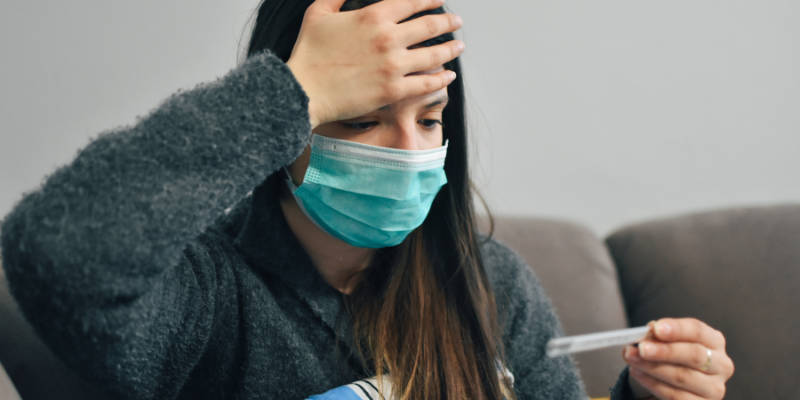
The novel coronavirus—now being called COVID-19—has already killed 3,200 people (mostly in China) and has infected over 94,000 people worldwide. In the U.S. at least 11 people have died from the virus and about 130 have been infected. In the wake of the rising numbers, San Francisco, Los Angeles, and several other U.S. cities have declared a health emergency.
Sounds terrifying, right?
Everyone is looking for ways to reduce their risk of developing COVID-19, but with all the hand-wringing about the outbreak, there’s one thing the media is neglecting. Did you know that having a mental health condition, such as depression or anxiety, weakens the immune system, decreases your ability to fight off illnesses and makes you more vulnerable to common colds, flu, and other viruses?
The connection between psychological well-being and physical health is real and experts call it “psychoneuroimmunology.” What are the mechanisms behind it? Research shows that depression ramps up the production of proinflammatory cytokines while compromising immune response. Anxiety and stress can trigger the body’s fight-or-flight response, which increases cortisol levels and alters immune system responses. And other mental health conditions, such as bipolar disorder, have long been associated with immune system dysfunction.
Seeking treatment for mental health issues is a critical step in shoring up the immune system. Here are 10 additional recommendations to strengthen your body’s ability to fend off viruses.
10 Ways to Boost Immunity
1. Hydrate your brain and body.
Staying adequately hydrated is critical for fending off viruses. Water oxygenates your brain and body so they can function at optimal levels. When your cells are operating at full capacity, they are better able to perform their primary functions. And when your brain is well-hydrated it helps you handle stress more effectively and allows you to make better decisions to help minimize your exposure to illness. For proper hydration, drink half your body weight in ounces of water. For example, if you weight 150 pounds, drink 75 ounces of water a day.
2. Skip or limit the booze.
Excessive drinking disrupts immune pathways and, according to a 2015 review of alcohol and the immune system, increases susceptibility to pneumonia and other illnesses. Chronic alcohol abuse also reduces the number of virus-fighting T-cells in the body, which lowers your ability to keep illnesses at bay. And a study in the journal Alcohol found that a single episode of binge drinking significantly disrupts the immune system.
3. Make sleep a priority.
Mom was right when she told you to get quality rest to avoid getting sick. A 2015 trial in the journal Sleep found that compared to people who sleep more than 7 hours a night, those who get only 6 hours or less of shut-eye are 4 times more likely to catch a cold after being exposed to the virus. Other research shows that chronic sleep deprivation suppresses the immune system. Be sure to seek help for sleep disorders, aim for 7-8 hours a night, and stick to an evening routine that encourages relaxation and restful sleep.
4. Protect your body with probiotics.
A 2014 study shows that probiotics support gut health and boost the immune system, which can help you fight off viruses. Include fermented foods like sauerkraut, kefir, or kimchi in your daily diet for added immunity support.
5. Eat from the rainbow.
Increase your intake of colorful fruits and vegetables. These antioxidant-rich foods have anti-viral properties that act as an army against foreign invaders, such as viruses and bacteria.
6. Munch on mushrooms.
The unique and diverse compounds in these fungi, not found in other plants, have been found to have immune-enhancing effects. Eat and cook with mushrooms and consider taking them as supplements. Among the most researched therapeutic mushrooms are Lion’s mane, shiitake, reishi, and cordyceps.
7. Go for garlic.
Consuming garlic can increase the number of T-cells—the body’s natural virus fighters—in the bloodstream. Findings from a 2012 study in Clinical Nutrition show that taking aged garlic extract minimizes cold and flu symptoms and shortens the duration of viral illnesses.
8. Pump up vitamin D levels.
Often referred to as the “sunshine vitamin,” vitamin D is actually a hormone that should be called the “immunity vitamin” thanks to its positive effects on the immune system. A 2009 report analyzed vitamin D levels in American adults and found that over 75% had low levels of this important vitamin. Get your levels checked and optimize them if necessary.
9. Power up with zinc.
This potent nutrient supports the immune system and helps your body defend itself from invading viruses and bacteria. Fuel up on zinc-rich foods like beef, oysters, lamb, asparagus, spinach, and pumpkin seed and consider taking zinc supplements.
10. Get moving.
Doing moderate exercise on a regular basis has been scientifically proven to enhance the immune system and reduce the risk of illness. It appears that even a single workout can give the immune system a boost. Going overboard with highly intense exercise, however, may have a negative effect on your ability to fight off viruses. A healthy approach is to walk fast—like you’re late for an appointment—for at least 30 minutes a day.
If you’re struggling with anxiety, panic attacks, depression, or other mental health issues, you aren’t alone—45% of Americans say the coronavirus pandemic has impacted their mental health. Just because you’re sheltering at home doesn’t mean you have to wait for the pandemic to be over before seeking help. In fact, during these uncertain times, your mental well-being is more important than ever and waiting to get treatment is likely to make your symptoms worsen over time.
At Amen Clinics, we’re here for you. We offer mental telehealth, remote clinical evaluations, and video therapy for adults, children, and couples, as well as in-clinic brain scanning to help our patients. Find out more by speaking to a specialist today at 888-288-9834. If all our specialists are busy helping others, you can also schedule a time to talk.





I need to know if you have something for sugar and blood pressure for my husband.
Thank you
Comment by Osmara Reyes — March 16, 2020 @ 3:22 AM
Love your work..I want to bring my Daughter to your clinic for a speck test.
She has a chronic condition..
Needs your expert advice..
We are in Australia..
Due to restrictions can we do video
Consult..
Regards Mary
Comment by Mary Gelagotis — March 16, 2020 @ 12:34 PM
hey mary I also am in Australia and frustrated that we have NOTHING available like this in our country. I would be interested to talk with you more. Kind regards Annette
Comment by Annette — March 16, 2020 @ 3:30 PM
Timely advice.
Comment by Lloyd Broomes — March 24, 2020 @ 3:04 PM
You could add:
* Do yoga breathing
* Limit your one-on-one interactions using FaceTime, Skype, Zoom or like tools
* Keep your shopping outside for three days
Comment by Susana Stoica — March 27, 2020 @ 6:18 AM
I am looking for information to help with the post Covid symptoms that cause everything to smell bad and taste bad. The symptom is only from my brain… things don’t really smell or taste bad to anyone but me. This started 6 months after I had covid. It has been a month now since it started… any help would be greatly appreciated.
Comment by Ann — February 10, 2022 @ 8:05 AM
Hello Ann, thank you for reaching out. You can find our resources on COVID here: https://amenclinics.com/blog/category/covid-19/.
Comment by Amen Clinics — February 15, 2022 @ 1:43 PM